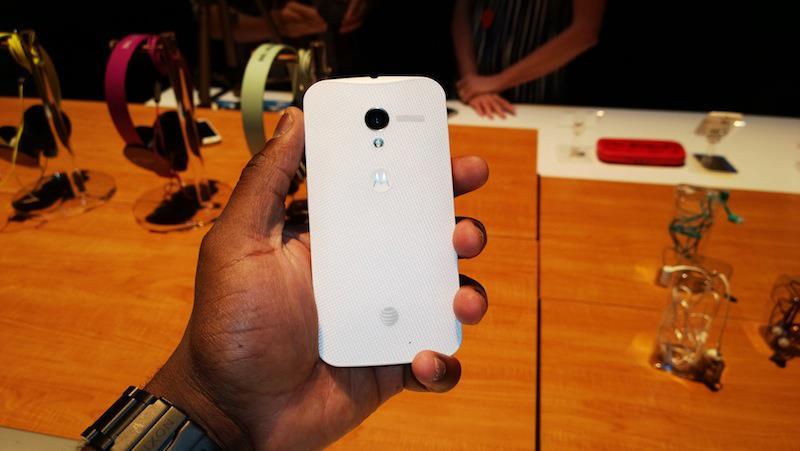
A lot has been said on the Moto X, and for good reason. For a device that most would label mid-range, it's still got plenty of spotlights focused in on it. A lot of speculation had built up before Motorola's "hero device" got its big unveil, and it's really up to you whether or not the device lived up to it or not. The handset is right around the corner, and it's headed to plenty of carriers here in the United States (and internationally). Basically, that means Motorola didn't commit the biggest self-betrayal for a manufacturer: They're bringing their hero device to more than one carrier, giving a lot more people out there a chance to get their hands on it by default.
All that tells me, though, is that contracts and subsidized pricing shouldn't have anything to do with the Moto X.
First, this is where I should point out that Verizon, AT&T and T-Mobile, three out of four of the major wireless carriers, are just getting started pushing their new monthly installment plans for their phones, so contracts may not play a big role anyway. However, the fact that you're still seeing the Moto X sold at "$199 on contract" means that's how it's going to be actively marketed.
Second, that price is too high for the Moto X. I agree wholeheartedly with my fellow editor Anna in this regard. While the Moto X has some great features, like Assist and the always-on voice activation, the specifications for the device aren't comparable to handsets like Samsung's Galaxy S 4 or HTC's One. Or, LG's G2 for that matter. (Granted, that particular phone could very well be expensive when it launches.)
Starting now, I want you to picture the HTC First. Get it in your mind. Got it? Now, remember that $99 price tag it launched with. Picture it right there, right next to the phone. Keep it in your mind, because we'll get back to it in a moment.
Recently, Leo Laporte dropped a couple of interesting pieces of information on "This Week in Google." We'll tackle one for now: That carriers are only paying $350 for the Moto X. We're going to look beyond the profit the carriers are making (because they need to make profit, obviously), and just focus on what this means for the consumer.
It could mean that there's a lot of wriggle room for the Moto X's pricing. Specifically, that $199 with a new, two-year contract pricing. Okay, hopefully you still have the HTC First and that $100 price tag in your mind, because this is where it comes in handy. I'm sure you remember that the First saw a pretty significant price drop almost immediately after it launched. It went from $99 to ninety-nine cents, which is still the price you can pick it up for if you really wanted to.
To me, it sounds like the price for the Moto X is a bit of an experiment. How will it fare in the market with that particular price point, versus the major competitors which are also selling for similar prices? Will it do better? The same? Or, will it do worse?
And if it does worse, does that mean we'll see a price drop? If the Moto X doesn't sell all that well once it's released, obviously one of the reasons that will be blamed is the price. So if the $199 price tag is too expensive, what would be a better price point? $149? $99?
We know the Moto X will eventually find its way to the Google Play Store, and we're all hoping that the device sees a price cut to its no-contract pricing. Some would hope that we see it drop down to the Nexus 4's pricing. But, is that possible? I mean, considering the Nexus 4's specifications are still . . . Better? . . . Than the Moto X's, would people really be willing to pay more, even sans a contract? The Moto X is newer, and sometimes that's enough for someone to pull the trigger on a purchase.
That's why I think the Moto X should be skipping that carrier lockdown and just be sold primarily through the Google Play Store. That would immediately open up the "Moto Maker" feature for all phones and carriers (sorry, AT&T), which would probably get more people interested in it.
What it would also mean is that the Moto X would be sold for around $300-$400, and I think that's a good price for the device, even compared to the Nexus 4 -- which should be getting replaced soon, anyway. And if it were being sold for that much, without a contract, with Moto Maker available out of the gate, and for multiple carriers (as it will be now), I believe more people would be willing to pick it up.
Right now, I can't see spending the same for a Moto X that I would for an HTC One -- with the contract, of course.
In any event, I want to know how you think the Moto X should have been released and made available. Do you think the device should be sold primarily, if not exclusively, through the Google Play Store and for around the same price as the Nexus 4? Or do you think the $500+ rumored price sans a contract is worth it? Will you pay $199 with a new, two-year contract to buy the Moto X? Let me know!